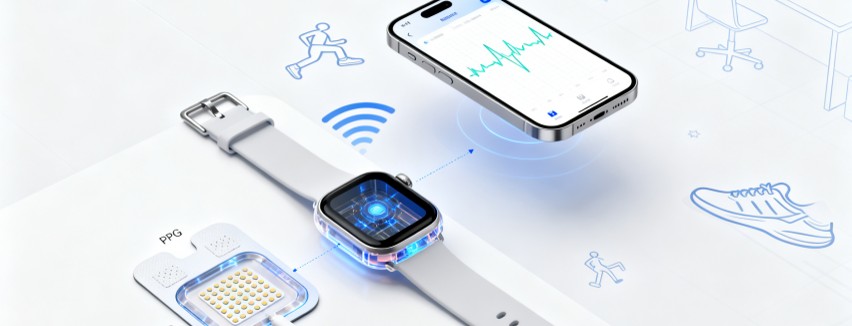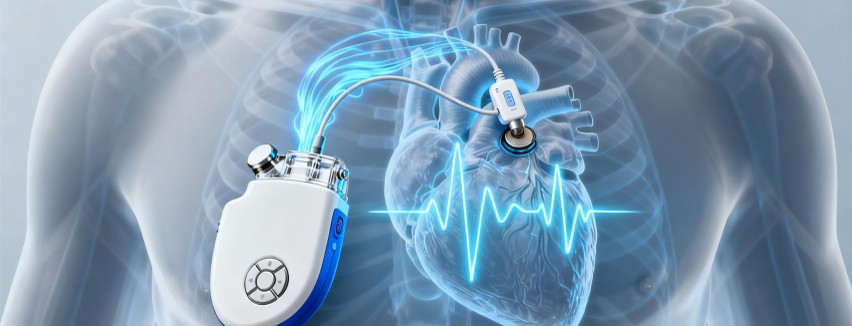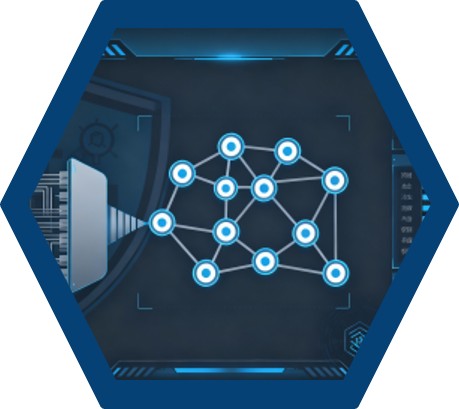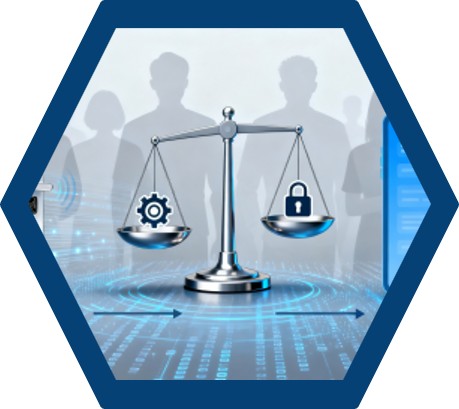Amalgamation of Cutting-Edge Monitoring Apparatus and Machine Learning Algorithms for Scalable Cardiovascular Disease Management
If you are interested in products and services related to the research phase in this field, please contact for further inquiries.
The landscape of cardiovascular monitoring is undergoing a transformative shift, driven by technological advancements that promise to revolutionize heart health management. Traditional methods, while effective, have long been constrained by limitations such as intermittent monitoring and delayed data interpretation. The advent of novel wearable and implantable devices, coupled with sophisticated machine learning algorithms, is poised to overcome these challenges, offering continuous, real-time monitoring and personalized care. This article explores the latest innovations in cardiovascular monitoring, highlighting their potential to enhance diagnostic accuracy, improve patient outcomes, and streamline healthcare delivery.
 Fig.1 Emerging paradigms for ambulatory monitoring. (Krittanawong C., et al., 2021)
Fig.1 Emerging paradigms for ambulatory monitoring. (Krittanawong C., et al., 2021)
The Evolution of Wearable and Implantable Devices

Wearable Devices: A New Era of Convenience and Innovation
Wearable devices have become a cornerstone of modern cardiovascular monitoring, offering non-invasive, continuous tracking of vital signs. Devices such as smartwatches, fitness trackers, and ECG patches leverage advanced sensors to monitor heart rate, rhythm, and other physiological parameters. The Apple Watch and KardiaMobile by Alivecor, for instance, utilize photoplethysmography (PPG) and ECG technology to detect arrhythmias like atrial fibrillation (AF) with clinical-level accuracy. These devices not only provide early detection of irregular heartbeats but also empower patients with real-time health insights.

Implantable Devices: Precision and Long-Term Monitoring
Implantable devices represent a significant advancement in cardiovascular monitoring, offering unparalleled precision and continuous data collection. Cardiac implantable electronic devices (CIEDs), such as pacemakers and defibrillators, are gold standards for rhythm detection, providing sensitive and specific measurements over extended periods. The Reveal LINQ system by Medtronic is an exemplary insertable cardiac monitor that offers long-term ECG monitoring, crucial for detecting intermittent arrhythmias. These devices not only monitor heart activity but also deliver therapy in real-time, making them essential tools in managing chronic cardiovascular conditions.
Machine Learning: Enhancing Accuracy and Personalized Care
- Machine Learning Algorithms for Biosignal Analysis
Machine learning algorithms have emerged as powerful tools for interpreting complex biosensor data, offering enhanced accuracy and actionable insights. Traditional analytical models rely on a limited number of biosignals and intuitive rules, which can introduce inaccuracies. In contrast, machine learning algorithms can process vast amounts of data, identifying complex patterns that are difficult for humans to discern. For instance, machine learning models can analyze continuous ECG data to predict the onset of ventricular arrhythmias or sudden cardiac arrest with high accuracy.
- Personalized Care through Deep Learning
Machine learning also enables personalized care by identifying novel disease phenotypes and predicting patient-specific outcomes. For example, machine learning models can analyze demographic, clinical, and laboratory data to predict the risk of heart failure hospitalization or the effectiveness of antiarrhythmic therapy. This capability allows for tailored treatment plans, optimizing patient outcomes. The integration of multiple data streams, such as ECG, pulse oximetry, and electronic medical records (EMR), further enhances the diagnostic accuracy and clinical relevance of these models.
Overcoming Challenges: Data Security, Privacy, and Ethical Considerations
Data Security in a Connected World
The integration of multiple data streams and the use of cloud-based systems raise significant concerns about data security. Healthcare providers, device manufacturers, and patients must navigate the complexities of data ownership, accessibility, and privacy. The FDA and other regulatory bodies are actively addressing these challenges, advocating for patient-centric models that empower individuals with control over their data. Blockchain technology, known for its robust security features, is being explored as a potential solution for securing patient data and ensuring data integrity.
Ethical Dilemmas in Continuous Monitoring
Continuous monitoring technologies also pose ethical dilemmas. For instance, the use of contactless sensing technologies in public spaces raises questions about patient consent and the responsibility of healthcare providers to inform and treat individuals. These issues must be carefully navigated to ensure that technological advancements do not compromise patient autonomy and privacy. Transparent data sharing policies and informed consent protocols are essential in addressing these ethical concerns.
Real-Time Cardiovascular Care: The Future is Now
- Real-Time Monitoring Systems
The integration of high-fidelity biosignal detection with broadband wireless connectivity and cloud processing is making real-time cardiovascular care a reality. Devices like the MCOT system for arrhythmia monitoring can automatically transmit data to central analysis hubs, alerting healthcare providers in real-time. This capability is particularly crucial during emergencies, such as impending sudden cardiac arrest, where timely intervention can be life-saving. Real-time monitoring systems not only enhance diagnostic accuracy but also facilitate rapid clinical decision-making, improving patient outcomes.
- Conditional Autonomy in Medical Systems
While fully autonomous systems are the goal in fields like autonomous driving, medical care systems require a balance between automation and human oversight. Conditional autonomy, where input from medical professionals and patients is integrated into decision-making, is likely to be the optimal approach. This model ensures that the speed and accuracy of automated systems are balanced with the nuanced judgment of healthcare providers, enhancing overall patient care.
Clinical Studies and Guidelines: Shaping the Future of Cardiovascular Monitoring
Key Clinical Studies
Numerous clinical studies have demonstrated the efficacy of advanced monitoring technologies. For instance, the LINK-HF study showed that a smartphone-based and cloud-based machine learning algorithm could predict the risk of heart failure hospitalization with high accuracy. Similarly, the Apple Heart study highlighted the potential of PPG-enabled devices to detect AF in asymptomatic individuals. These studies underscore the transformative potential of advanced monitoring technologies in cardiovascular care.
Guidelines and Recommendations
Professional medical societies and regulatory agencies are increasingly recognizing the value of advanced monitoring technologies. Guidelines from the American Heart Association (AHA), the American College of Cardiology (ACC), and the European Society of Cardiology (ESC) now include recommendations for the use of wearable devices and machine learning algorithms in cardiovascular care. These guidelines emphasize the importance of continuous monitoring in detecting subclinical conditions and guiding therapeutic decisions, shaping the future of cardiovascular monitoring.
Conclusion: A New Era in Cardiovascular Health
The integration of novel monitoring devices with machine learning technology marks a new era in cardiovascular health. These advancements offer unprecedented opportunities for early detection, personalized care, and real-time intervention. While challenges remain in data security, privacy, and ethical considerations, the potential benefits are immense. As technology continues to evolve, the future of cardiovascular monitoring promises to be more accurate, accessible, and patient-centric. The journey towards healthier hearts is well underway, driven by innovation and a commitment to improving lives.
If you have related needs, please feel free to contact us for more information or product support.
Reference
- Krittanawong, Chayakrit, et al. "Integration of novel monitoring devices with machine learning technology for scalable cardiovascular management." Nature Reviews Cardiology 18.2 (2021): 75-91.
This article is for research use only. Do not use in any diagnostic or therapeutic application.



 Fig.1 Emerging paradigms for ambulatory monitoring. (Krittanawong C., et al., 2021)
Fig.1 Emerging paradigms for ambulatory monitoring. (Krittanawong C., et al., 2021) 


